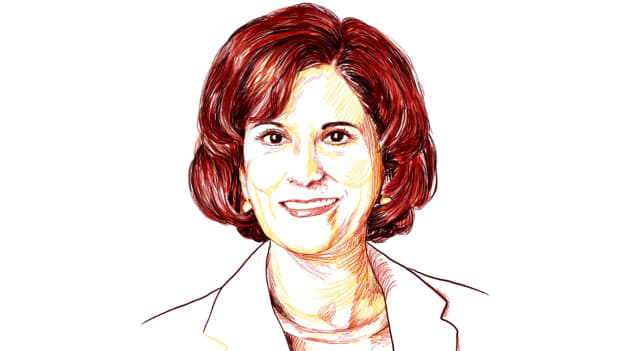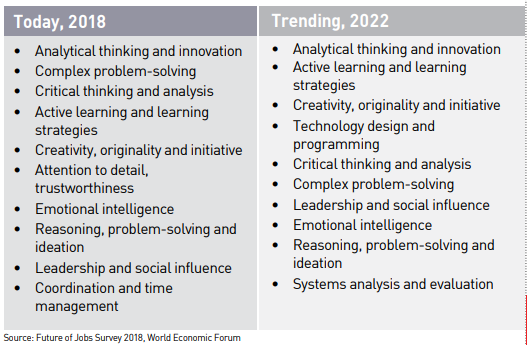Augmenting 'humans' in the workplace

Jeanne is the Founding Partner of Future Workplace, an HR advisory and research firm providing insights on the future of learning and working. Jeanne is the receipt of the Distinguished Contribution in Workplace Learning Award by the Association for Talent Development (ATD).
Author of four books, Jeanne was previously Vice President of Market Development at Accenture.
Here are the excerpts of the interview with Jeanne.
How do you envision the future of HR?
HR has evolved from a focus on standardization, efficiency and one-size-fit-all to one which is personalized to the needs of employees and is characterized by immediacy, human centered design and quality of the employee experience. This modern HR must deeply understand how employees work today—and how their work will evolve in a future organization where work and the worker is augmented by artificial intelligence. Gartner predicts that by 2022 one in five knowledge workers will work side by side with a digital assistant. This new world of HR has implications for HR and business leaders. For HR, this means, your HR leader needs to hire HR professionals who understand an emerging technology landscape, are familiar with the new venture-backed players of AI for HR and finally are able to work closely with their colleagues in HRIS to identify a range of business problems AI and other emerging technologies such as virtual reality can solve for the organization. Business leaders must understand creating a new vision for HR and setting about to leverage the power of HR technology to create a more compelling employee experience is not an HR issue but a business one. And this is one that is a team sport and brings together HR, IT, Marketing, Communications and Real Estate into a cross-functional team to address how to create and deliver a new vision for employee experience. As I stressed in my book, "the last best experience that anyone has anywhere will become the minimum expectation for all the experiences they want everywhere especially in the workplace."
How do you see the readiness of businesses in terms of preparing their workers for disruption ahead?
According to recent research by MIT, Nearly 90 percent of managers and executives surveyed by MIT Sloan Management Review anticipate that their industries will be disrupted by digital trends to a great or moderate extent, but only 44 percent say their organizations are adequately preparing for the disruptions to come.
In times of constant and accelerated change, organizations that do not adapt, that do not anticipate the future and take action, are in danger of irrelevancy—or worse, extinction. Consider that 52 percent of Fortune 500 organizations have merged, been acquired, or gone bankrupt since 2000, according to Capgemini. Traditionally it has taken 20 years for the average company on the Fortune 500 list to reach a $1 billion market cap. But Google achieved that in eight years, Facebook in five years, Tesla in four years, Uber in two years, Snapchat in two years and Oculus Rift in 14 months! What’s different about six companies is how they operate: they are intense learning machines, they are led by agile leaders, they think of technology as both a disrupter and enabler, they are manically focused on satisfying customers and employees, and, importantly, they have employees who are workplace activists proposing the changes they see needed in the workplace. Business leaders can ensure they are preparing their workforce by applying a growth mindset and as Satya Nadella, CEO of Microsoft says, "adopting a Learn It All Mindset rather than a Know It All Mindset." This starts with a belief in the power of continuous learning and becoming a people positive organization.
What's your take on the new skills needed for the future workplace and training programs to train workers to perform the jobs of the future?
While the focus on new skills needed for the future workplace often identifies technical skills, I believe it is a combination of human and technical skills that will be in the highest demand in the next five years. This point of view is reinforced by a survey conducted by MIT Sloan Management Review of a population of global managers and leaders. When they were asked the most important skill for leaders to succeed in a digital workplace, only 18 percent of respondents listed technological skills as most important. Instead, they highlighted having a transformative vision (22 percent), demonstrating collaborative skills (20 percent) being a forward thinker (20 percent), and having a change-oriented mindset (18 percent).
This mix of technical and human skills needed in the future is shown below.

Now when we think about how these skills are being developed, we are seeing a shift from custom-designed programs to curation of programs delivered in multiple modalities from online courses, to podcasts, blogs, videos and a range of performance support tools.
Do you think it's time for HR to leverage Analytics tools? Where do you see analytics for HR heading?
It's happening today among forward-thinking HR leaders. They are leveraging machine learning and analytics to make data-driven decisions. IBM for instance, developed a patent to predict retention risk for employees in key job roles. The company put together a team of data scientists (who are part of IBM HR) to analyze several employee risk factors such as location of employee, compensation, employee engagement sentiment, and even manager engagement at the aggregate level for countries and job roles. Based on analyzing this data, certain employee groups in key job roles that may be at risk to leave the organization. The output of this are recommendations to managers proposing manager intervention to prevent departures. This program known as Proactive Retention has saved IBM over $130 million as measured by avoiding the costs of hiring and training replacements.
But while this is new and we see a growing number of both technology companies such as IBM, Cisco and Intel making extensive use of analytics to guide people decisions, we are also seeing this in industry sectors outside of technology such as hospitality, (Hilton Hotel and Marriott use artificial intelligence for sourcing and screening employees) and healthcare, (Partners Healthcare use artificial intelligence in nursing education.)
How can HR help employees prepare for an uncertain future?
Many HR and business leaders are not prepared for the future of work and specifically how to leverage artificial intelligence to augment humans in the workplace. HR leaders should ask themselves and their teams some questions which focus on short medium and long term:
SHORT TERM
1) What is our current value proposition to the business?
2) How well are we competing for and retaining talent versus our competition?
3) How is the composition of our workforce changing in terms of age, gender and ethnicity?
MEDIUM TERM
1) How could we compete for more diverse talent?
2) Where could we compete for diverse talent?
3) What enhancements could we make to our current employer value proposition?
LONGER TERM
1) What are the big bets we can make for attracting a more diverse future workforce?
2) How can we adjust our recruiting to recruit more on skills and competencies and less on degrees and credentials?
3) What will be our strategy regarding employee upskilling, so it is more of a required employee benefit (like healthcare) and less of an investment?
How will Artificial Intelligence and robotics impact how work gets done?
AI will impact all aspects of the employee life cycle from sourcing and screening employees, to new hire onboarding, internal talent mobility, learning and development, and coaching. The impact of AI in the workplace will be significant such as:
1) The workforce will be blended including full-time workers, gig workers and robots. In this new blended workforce of Humans + Gigs+ Robots, humans are able to work smarter by the scale and agility of Gig workers and real-time data insights provided by machines.
2) New job roles will emerge as AI is leveraged across the enterprise. Three of my favorites include:
- Voice UX Designer: This role will leverage voice as a platform to deliver an “optimal” dialect and sound that is pleasing to each of the seven billion humans on the planet. The Voice UX Designer will do this by creating a set of AI tools and algorithms to help individuals find their “perfect voice” assistant.
- Chief Ethics Officer: This new role will focus on developing strategies to use technology in an ethical and humane way. More companies will establish new jobs focusing on ethical uses of AI to ensure AI's trustworthiness, while also helping to diffuse fears and misperceptions about it.
- Head of Business Behavior: The head of business behavior will analyze employee behavioral data to create strategies to improve employee experience, collaboration, productivity, and employee well-being.
3) As we head into 2019 — with AI moving from consumers' lives into the workplace – upskilling non-AI workers to learn how to work with AI is becoming increasingly important.
In the wake of all this change, how should CEOs, CHROs, and business leaders collaborate?
The pace of change has never been this fast, yet it will never be this slow again. This means all leaders: HR, Business, IT, Real Estate, Marketing and Communications must work in tandem to agree on the business problem that needs to be solved and the current and emerging KPI's to track success. I believe this means leaders must become workplace activists, meaning they must anticipate future changes to their company’s operating model and be prepared to put into place the changes needed to navigate the future workforce and workplace.
Everything we have taken granted about work, the workplace, where work happens and what's our job is being turned on its head. While there is growing interest and success in using artificial intelligence in the workplace to create a more personalized candidate and employee experience, there are also a host of new issues to grapple with. These revolve around data privacy, security and transparency. Since companies are storing sensitive information on pay, job history, age, healthcare data, and other personal information companies must communicate how they are protecting this data and importantly how this data will be used now and as the organization increases its use of artificial intelligence in the workplace.















